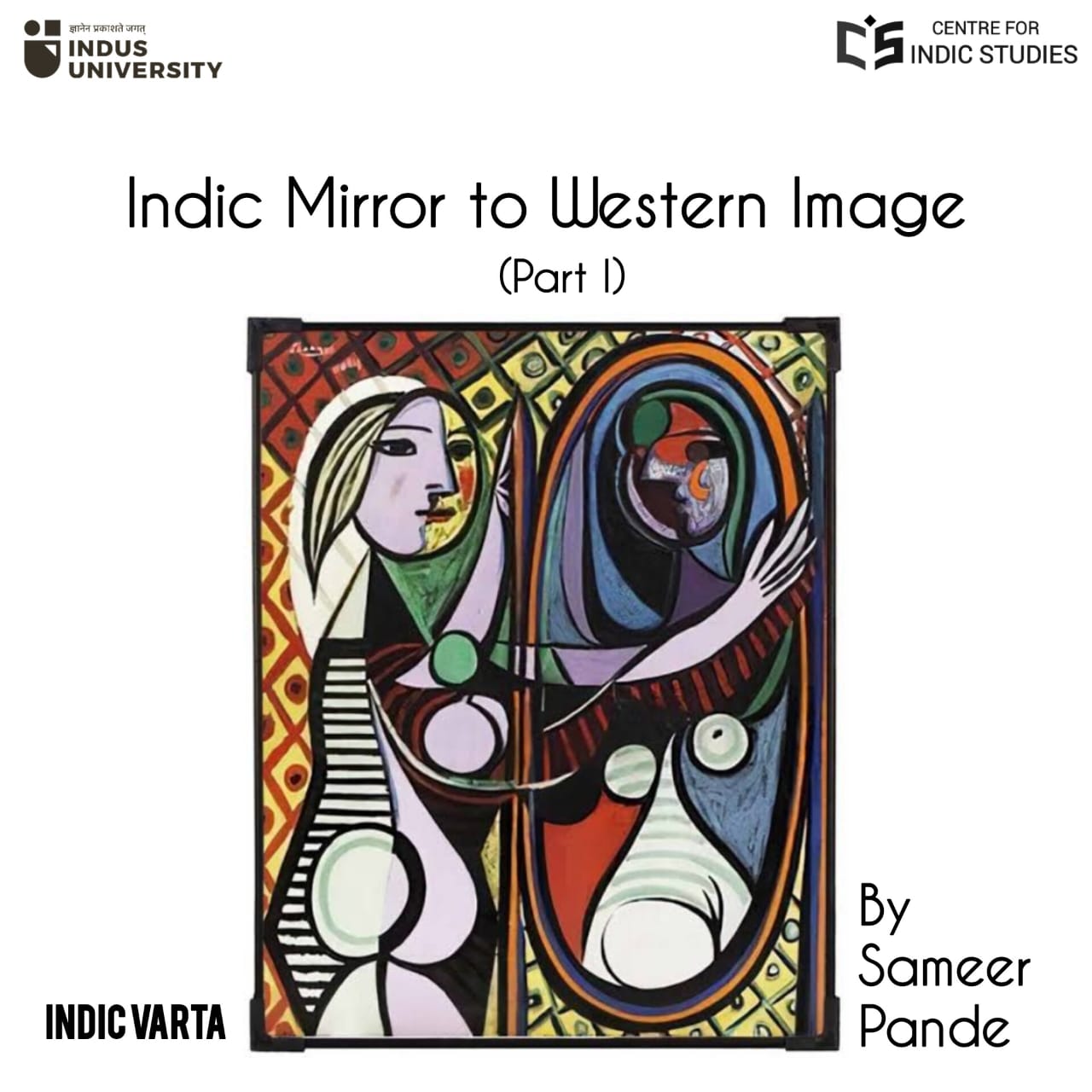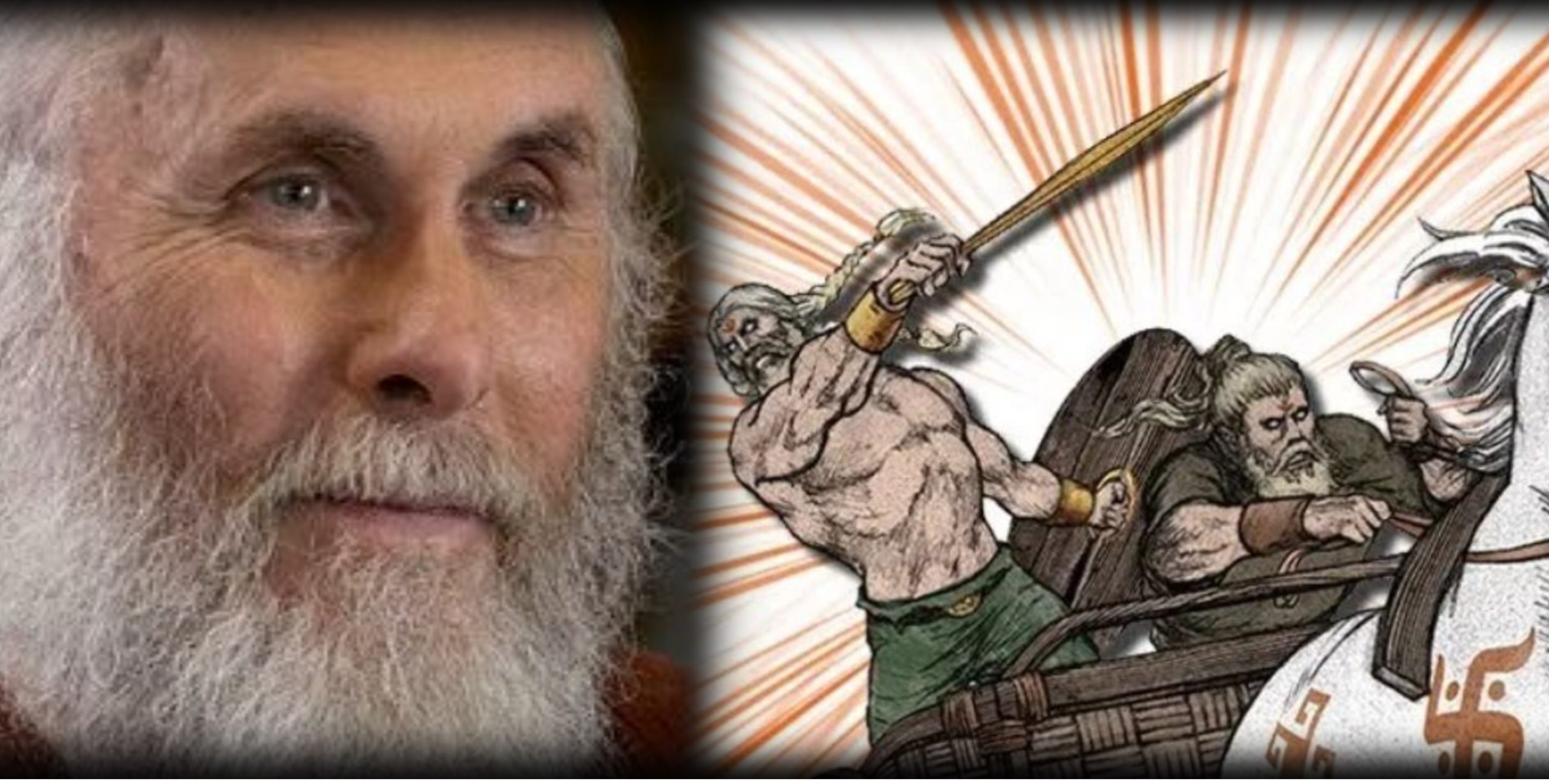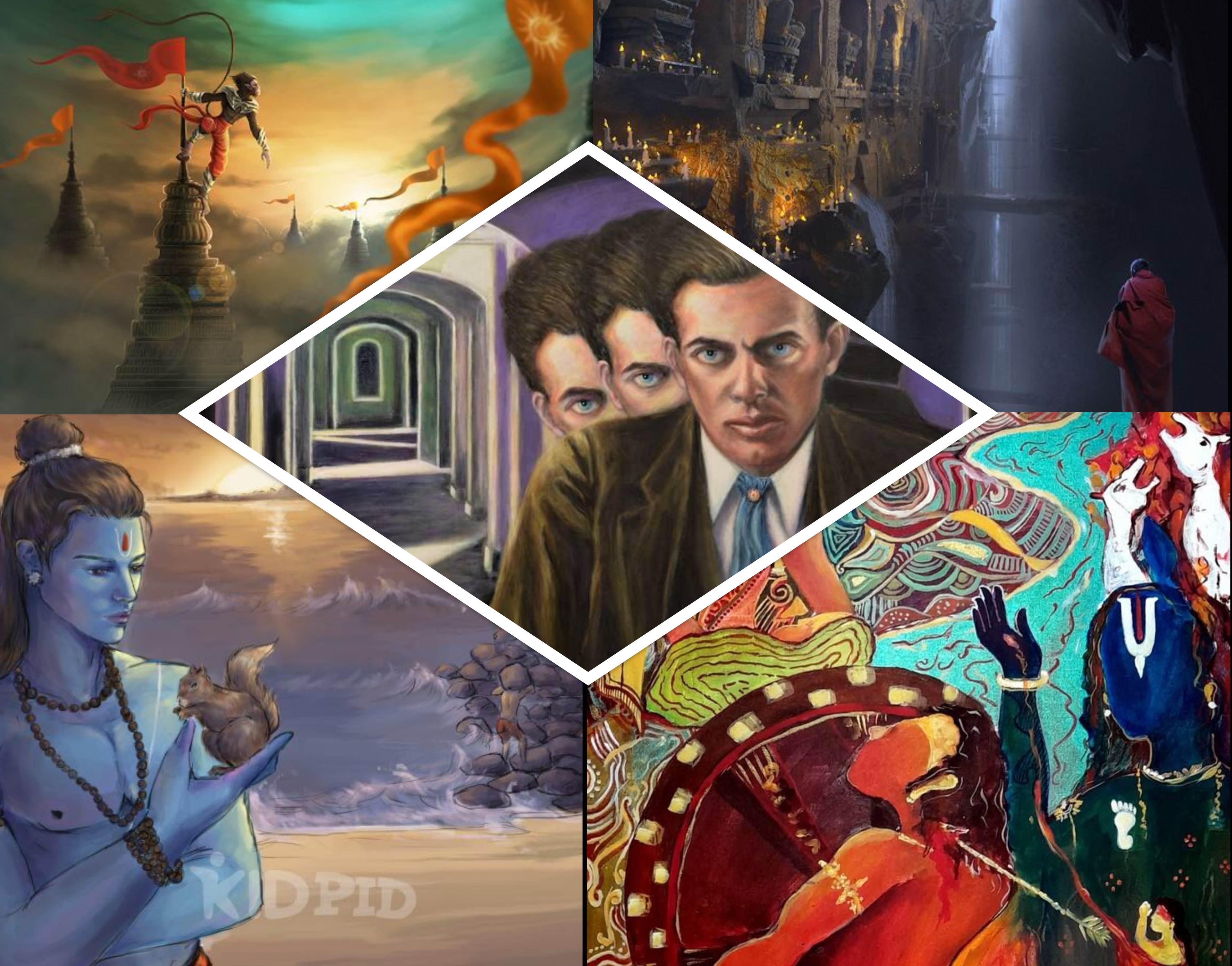- Visitor:124
- Published on: 2025-02-08 11:04 am
Indic Mirror to Western Image (Part I)
The article explores the limitations and contradictions of Western civilization, emphasizing its pursuit of material progress, technological innovation, and surface-level achievements while neglecting deeper, timeless wisdom. It critiques the exclusivity of Abrahamic religions, the ideological battles between capitalism and communism, and the fragmented worldview that separates mind from body. It highlights issues like individualism, environmental degradation, media manipulation, and the loss of communal bonds. The author calls for a return to spiritual and philosophical depth, urging the West to acknowledge its historical complexities and learn from Eastern traditions to find true substance and meaning in life.

The Search for Substance
The West or the western civilization, in its pursuit of progress, often finds itself ensnared by the allure of surface-level innovation, sacrificing depth for the sake of novelty. The fast-paced nature of contemporary life, amplified by technology, rewards soundbites over sagas, and Instagram ‘filters’ obscure the raw authenticity of lived experience and beneath the glossy veneer of consumerism and digital fame, there lies a profound hunger for substance - a yearning to understand the marrow of existence. The Western obsession with immediacy and the next breakthrough clouds the deeper, more timeless truths that have often been the foundation of human wisdom. The question, then, is not one of progress itself, but of the direction and depth of that progress. In a world captivated by the flashy and the fast, the thirst for meaningful insight remains largely unquenched.
Exclusivist Doctrines
This search for substance is further complicated by the legacy of the Semitic religions—Judaism, Christianity, and Islam—that have shaped much of the Western worldview. These Abrahamic faiths, with their emphatic exclusivist doctrines, have created myriad and glossy ‘rich’ cultural traditions but also deep divides. While their narratives provide unifying visions for their followers, they have often erected barriers between the faithful and those outside their fold. The question of transcending dogma - of finding common spiritual ground - remains a daunting challenge for the West. There is a pressing need to embrace pluralism, to acknowledge that while these religions provide distinct paths to the divine, the threads of shared spirituality connect all of humanity. The Western intellectual tradition has often celebrated the tension between faith and reason, but today, there is a greater need to move beyond sectarianism and to build bridges of understanding that recognize both difference and commonality.
The Dilemmatic Dilemma
Inextricably tied to this tension is the paradox at the heart of Western society: the elevation of material progress often belies the fragility of its foundational underpinnings. The West has built soaring skyscrapers and technological marvels, yet these accomplishments sometimes sit atop shaky foundations. The philosophical bedrock - once grounded, if it was, in Greco-Roman thought, indigenous wisdom, and the echoes of forgotten sages - has eroded in the rush toward modernization triumphing imperialism and industrial revolution. As Western societies race forward, they risk losing sight of the roots that nourish deeper meaning. The values that once held civilizations together—those of community, reciprocity, and introspection—are too often dismissed in favor of progress that is outward and quantifiable. In doing so, they lose the anchor that might give their achievements true substance and coherence.
This dilemma extends to the ideological battleground between capitalism and communism, where the West’s economic landscape has long been defined by a tension between the invisible hand of the market and the collectivist embrace of state intervention. Capitalism, with its promise of individual freedom and prosperity, has yielded immense wealth, but it has also exacerbated inequalities and environmental degradation, causing rifts. Communism, with its promise of equality and collective good, has often struggled in practice, yielding authoritarian regimes rather than the utopian ideal of a classless society. In seeking an equilibrium between these two extremes, the West is engaged in a continuous experiment - a quest to reconcile the pursuit of prosperity with the need for compassion and justice, without the bedrock of Dharma. Yet neither ideology, in its purest form, fully satisfies the complex and nuanced needs of the human spirit.
The Confused Mind in a Strong Body?
Moreover, the legacy of Cartesian thought continues to haunt the West’s understanding of the world. The separation of mind from body, of science from soul, has created a fragmented view of reality. This compartmentalization - a tendency to treat disciplines as distinct and disconnected from each other - has obscured the interconnectedness of life. In their relentless quest for objectivity and rationality, they have divorced themselves from the holistic understanding that sees art and science, reason and wonder, not as opposing forces but as complementary. The attempt to measure and dissect reality into neat categories is a reflection of a deeper longing for control, yet the wholeness of existence resists such simplifications. In the natural world, in the arts, and in human relationships, the whole is far more than the sum of its parts. To recover a sense of unity, the West must move beyond the reductive and embrace the complexity of life’s interconnectedness.
The Fractured Families and Condescending Communities
This fragmentation is also evident in the erosion of community bonds, a key casualty of the West’s relentless drive toward individualism. In the past, the village square, with its shared stories and collective wisdom, served as the center of social life. Today, the digital age, with its constant connectivity and virtual relationships, has left many feeling more isolated than ever before. The ideals of individual autonomy, while crucial in the development of personal freedom, have too often undermined the fabric of communal life. In a society where people are increasingly disconnected from their neighbors, from their physical environments, and from one another, the quest for genuine connection becomes more urgent. We find ourselves longing not for the next technological innovation but for the warmth of human presence—the reassurance that we are part of something larger than ourselves. It is in community that resilience is nurtured and in shared experiences that life’s deepest meanings are often revealed.
Prometheus in the Wrong Pursuit
At the heart of Western technological ambition lies a form of hubris that echoes the myth of Prometheus. While the West has become the cradle of technological innovation—from artificial intelligence to biotechnology—its creations often outpace the ethical considerations that should guide them. In the rush to conquer new frontiers, whether in space, in biology, or in computing, there is a growing awareness that humanity’s mastery over nature may not be matched by its wisdom. The challenge is not simply one of innovation but of ethics—the need to wield these powerful tools in ways that are responsible and mindful of their potential consequences. The West must confront the possibility that, in its race to master the world, it might be sowing the seeds of its own undoing.
The Haunting Narratives of Untruths and False
The media, too, plays a critical role in shaping the Western worldview, though often in ways that reinforce existing biases. In the digital age, information is abundant, yet discernment has become increasingly rare. Algorithms, designed to enhance our engagement with content, have instead created echo chambers where dissenting voices are drowned out, and nuance is often lost. The Western media landscape, driven by clicks and views rather than depth and insight, further perpetuates this cycle. In such an environment, the pursuit of truth becomes secondary to the pursuit of attention. To break free from this cycle, there is a pressing need for the media to foster diversity of thought, to encourage critical engagement, and to amplify the voices of those who challenge dominant narratives.
The Snoozed ‘Environmental’ Alarm Just Stopped
At the same time, the West’s environmental footprint continues to expand, leaving a trail of destruction in its wake. Concrete jungles rise as forests recede, and the climate crisis escalates. The disconnection from nature, a product of centuries of industrialization and urbanization, has reached a point where the rhythms of the Earth seem like distant echoes. Yet, in a world increasingly beset by environmental crises, the need for a renewed relationship with the natural world has never been greater. Reconnecting with nature—whether through urban green spaces, wilderness retreats, or a renewed commitment to sustainable living—offers a path back to reverence for the Earth and its interconnected ecosystems.
This environmental crisis is entwined with a broader existential dilemma that pervades Western societies. In an age of unprecedented material wealth, there remains a profound hunger for meaning. The pursuit of profit, productivity, and consumption has failed to satiate the deeper longings of the human soul. What does it mean to live a good life in the 21st century? For many in the West, the search for meaning has become a quest for transcendence, whether through mindfulness, art, or a renewed spiritual practice. The modern world, with all its wealth and technological marvels, has yet to answer the age-old question of what makes life worth living. In the absence of a coherent spiritual or philosophical framework, many are turning to alternative sources of meaning, yet the search remains fragmented and elusive.
From ‘We Are’ to ‘Why Are We?’
Finally, the West finds itself in the midst of a crisis of identity. For centuries, it has defined itself as the birthplace of Enlightenment reason, the champion of human rights, and the crucible of modernity. Yet this narrative is complicated by the legacy of colonialism, slavery, and exploitation. As the West confronts the complexities of migration, multiculturalism, and globalization, it struggles to reconcile its past with its present. Who are we, as a civilization, in the face of such contradictions? This identity crisis extends beyond national borders, as the West grapples with its place in a rapidly changing world order. The quest for a cohesive narrative - one that acknowledges both the triumphs and the scars of history - remains a work in progress.
In this context, the West’s historical amnesia becomes a significant hindrance. The painful chapters of the past, from the Crusades to the Inquisition, from the transatlantic slave trade to the colonization of Asia and Africa, are often left unexamined, gathering dust in the corners of national memory. The challenge is not to dwell in guilt but to acknowledge these shadows with honesty and responsibility. Only through this reckoning can the West move forward, carrying the weight of its history while forging a path toward a more inclusive and responsible future. In this quest, sure the answer lies in the mirror of Eastern civilization.
- 62 min read
- 7
- 0







.jpg)


